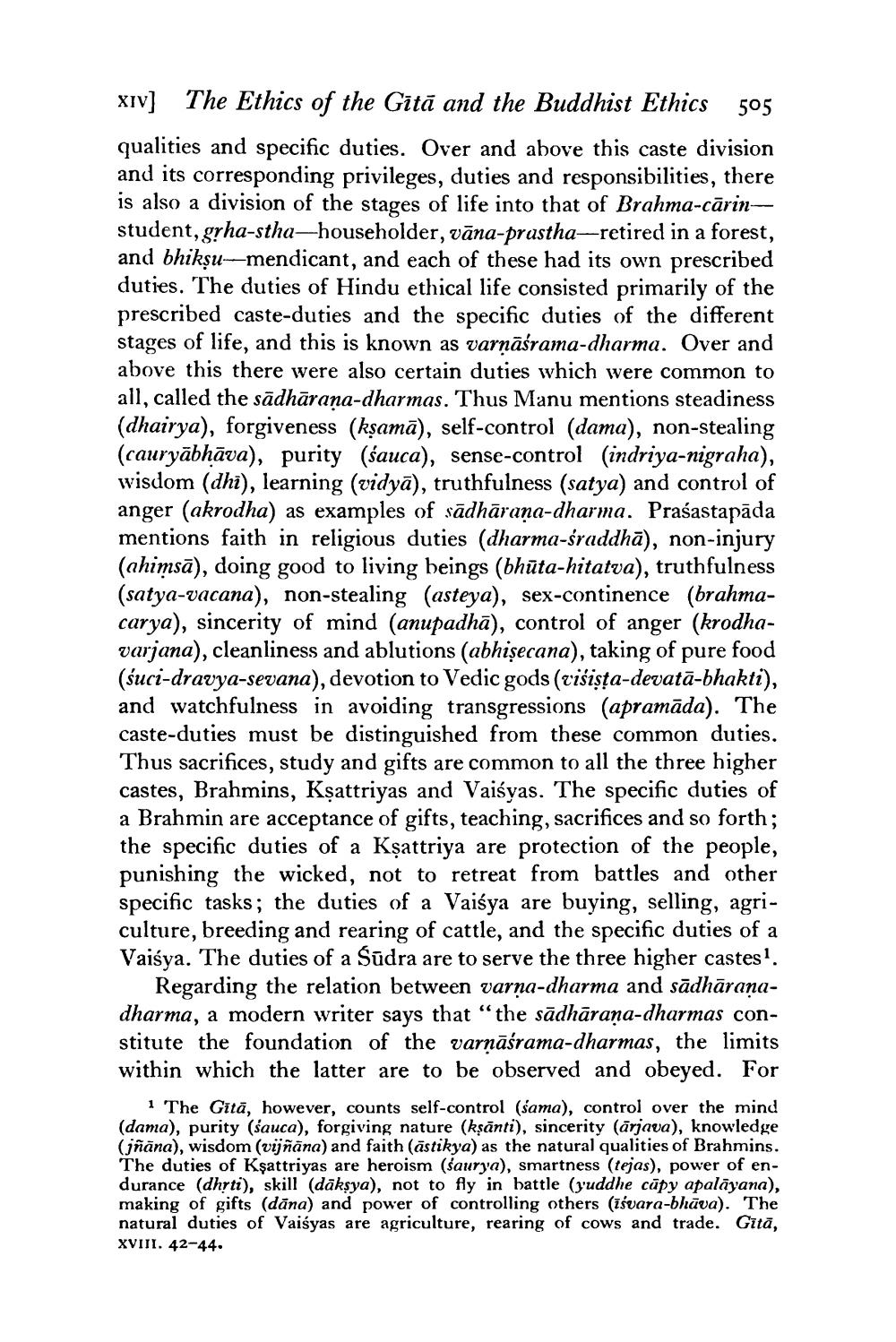________________
XIV] The Ethics of the Gita and the Buddhist Ethics
505 qualities and specific duties. Over and above this caste division and its corresponding privileges, duties and responsibilities, there is also a division of the stages of life into that of Brahma-carinstudent, grha-stha-householder, vāna-prastha-retired in a forest, and bhikṣu-mendicant, and each of these had its own prescribed duties. The duties of Hindu ethical life consisted primarily of the prescribed caste-duties and the specific duties of the different stages of life, and this is known as varṇāśrama-dharma. Over and above this there were also certain duties which were common to all, called the sadhāraṇa-dharmas. Thus Manu mentions steadiness (dhairya), forgiveness (kṣamā), self-control (dama), non-stealing (cauryābhāva), purity (śauca), sense-control (indriya-nigraha), wisdom (dhi), learning (vidyā), truthfulness (satya) and control of anger (akrodha) as examples of sādhāraṇa-dharma. Prasastapāda mentions faith in religious duties (dharma-śraddha), non-injury (ahimsa), doing good to living beings (bhūta-hitatva), truthfulness (satya-vacana), non-stealing (asteya), sex-continence (brahmacarya), sincerity of mind (anupadhā), control of anger (krodhavarjana), cleanliness and ablutions (abhiṣecana), taking of pure food (śuci-dravya-sevana), devotion to Vedic gods (visiṣṭa-devatā-bhakti), and watchfulness in avoiding transgressions (apramāda). The caste-duties must be distinguished from these common duties. Thus sacrifices, study and gifts are common to all the three higher castes, Brahmins, Kṣattriyas and Vaisyas. The specific duties of a Brahmin are acceptance of gifts, teaching, sacrifices and so forth; the specific duties of a Kṣattriya are protection of the people, punishing the wicked, not to retreat from battles and other specific tasks; the duties of a Vaiśya are buying, selling, agriculture, breeding and rearing of cattle, and the specific duties of a Vaisya. The duties of a Sūdra are to serve the three higher castes'.
Regarding the relation between varṇa-dharma and sādhāraṇadharma, a modern writer says that "the sādhāraṇa-dharmas constitute the foundation of the varṇāśrama-dharmas, the limits within which the latter are to be observed and obeyed. For
1 The Gitā, however, counts self-control (sama), control over the mind (dama), purity (sauca), forgiving nature (kṣānti), sincerity (ārjava), knowledge (jñāna), wisdom (vijñāna) and faith (astikya) as the natural qualities of Brahmins. The duties of Kşattriyas are heroism (saurya), smartness (tejas), power of endurance (dhrti), skill (dākṣya), not to fly in battle (yuddhe capy apalayana), making of gifts (dana) and power of controlling others (isvara-bhava). The natural duties of Vaisyas are agriculture, rearing of cows and trade. Gitā, XVIII. 42-44.




